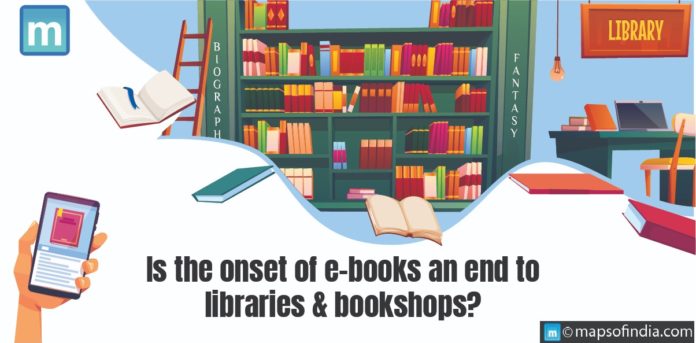The soft brown old-tinted pages of vintage books on the wooden shelves of your grandmother, running your hands through their edges, breathing in the scents of the generation before you who went and rummaged through those lovely scripts. If the imagery isn’t vivid enough, ask a book buff or an avid reader how scintillating that must feel. The feel of books, old or new, is just as astoundable as the solemns childhood memories.
With the modern era and technology coming, human civilization has been bestowed with many other online alternatives to physical books. Through the gadgets of Kindle and E-books, people have been exposed to a range of books easily accessible at the tip of their fingers. Through e-books, we could browse, choose, buy, and read any book, anytime and at any random place. Its availability is round the clock and extremely easy to carry everywhere.
The burgeoning fear
There is no denying that e-books come with unique benefits that might, in some ways, surpass the benefits of physical books. From being easily accessible, having a range of eco-friendly, to even being cheaper than the physical copies. However, despite the upsides, they might still need to usurp the magic that physical books have bestowed upon us since immemorial.
Replacing libraries and bookshops won’t be that easy
However practical or efficient the technology is, replacing the old-school feel and habit of sitting in libraries and heaving in the exhilaration of physical books is impossible.
-
Copyright Issues
Accessing online books from unauthorized sites often leads to a prolonged legal case or action against the user. After all, the copyright issues involved in anything online are highly contentious. This also restricts the lending of books due to the various Digital Rights Management involved.
-
Durability
Physical books have an amazing shelf life and can be passed on to many generations. However, e-books, or books stored in iPads, mobile phones, or any other gadgets, have a high risk of being lost in some technical glitch and thus are less durable. They might also lose power, disturbing your flow of reading.
-
Limitations
The technological advancements come with their limitations and drawbacks. With the growing progress in the field, the older versions of books might not find themselves in the same compatibility with the updated version of your software. Also the attack of viruses and further loss of books can easily be evaded through physical copies of books. It’s common for e-books to blank out at slight virus attacks anytime, anywhere.
-
Cost-effectiveness
Physical books’ durability, maintenance, and repair costs are more cost-efficient than e-books. You can even sell them further, which is usually not true with e-books. Also, buying old copies of physical books is another upper hand that they have.
-
An ode to writers
The 600-page book we book nerds consume voraciously in less than two days is a work of years and years that has been invested in by our lovely writers. A lot of effort, time, research, and dedication goes into curating that one book. Above all, writers pour their heart out to speak to the readers and connect with them as a step towards paying a nod to the writers we adore so they can have their fair share of their royalty; choosing physical books is always wise.
Libraries and bookstores aren’t just tall buildings filled with many books. Apart from the romanticism of it, they also provide for living the first-hand experience of navigating through books that generations before us did and cherished. The recent layoffs led people to believe that AI might replace humans, but multiple studies proved otherwise. The coming of e-shopping reduced retail shops but didn’t vanish them all, just like any other technological advancements that, although became a pompous part of our daily lives, did not entirely erase the reminiscences and cheers of the past. Libraries are here to stay, and no matter the surge of e-books encircling the market, they can never come close to being a fitting substitute.




